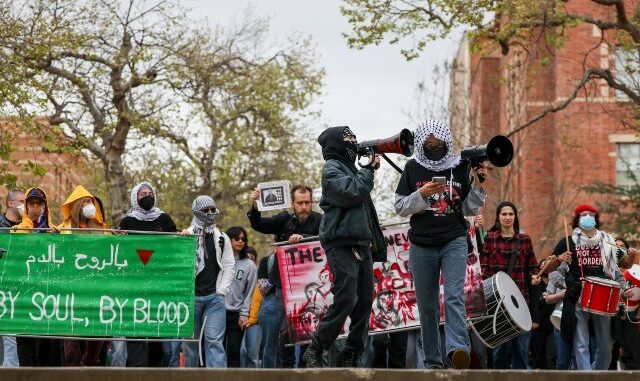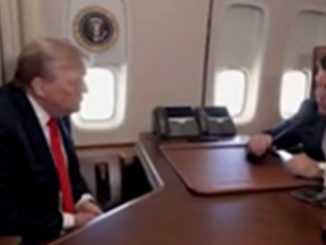
College students are reportedly vowing to continue their anti-Israel protests, despite the Israel and Hamas ceasefire deal.
Published October 15, 2025
Despite a long-awaited ceasefire between Israel and Hamas — and the release of hostages — a number of U.S. college students have vowed to continue their anti-Israel demonstrations, raising questions about what these protests are truly about.
From California to New York, campus activists are signaling that peace was never their goal. Even as the guns fall silent in Gaza, their rallies, encampments, and “divestment” campaigns are gearing up for another round — this time targeting their own universities, donors, and anyone unwilling to adopt their one-sided political narrative.
Ceasefire Changes Nothing for Radical Activists
At UCLA, doctoral student Dylan Kupsh admitted bluntly to the Los Angeles Times that the ceasefire “changes nothing” at American universities. Organizers of Students for Justice in Palestine (SJP) — one of the loudest and most controversial groups on campuses — declared that their mission would continue regardless of peace efforts or hostage releases.
Ryan Witt, president of SJP at Cal State Channel Islands, told reporters the ceasefire is “welcome,” but “not enough.” In other words, no matter what happens in Israel or Gaza, the protests — and their political targets — will continue.
This sentiment, reported by both Breitbart News and the Los Angeles Times, underscores how the movement has morphed from anti-war protest into a broader ideological crusade against the U.S., Israel, capitalism, and even free speech itself.
Universities Under Siege
Campus administrators are finding themselves trapped between two forces:
-
Militant student activists who stage sit-ins, occupy buildings, and disrupt classes.
-
Lawmakers and parents demanding accountability after a year of anti-Semitic slogans, intimidation, and outright vandalism.
Several schools in California and beyond have already banned or suspended SJP chapters after incidents of harassment and property damage. UCLA and Columbia University both faced national backlash after students erected illegal encampments and blocked access to facilities.
While universities cite “safety” and “hate speech” as reasons for the crackdowns, many observers say the deeper issue is a generation of students radicalized by social media activism, encouraged by professors who frame Western democracy and Israel as colonial oppressors.
Free Speech for Some — Not for All
One of the more striking contradictions of these protests is their selective defense of “free speech.”
When conservative or pro-Israel speakers are invited to campuses, they’re often shouted down or disinvited altogether. But when far-left groups call for “intifada” or justify Hamas attacks as “resistance,” administrators hesitate to respond, fearing backlash from activist circles and faculty allies.
Breitbart has reported that even with the ceasefire in place, many activists are doubling down — planning “teach-ins” and protests focused on “decolonization,” a term critics say has become code for erasing Israel entirely.
What’s Really Driving the Movement
While the images of war once fueled campus outrage, it’s clear that the current wave of activism has little to do with humanitarian concern.
If the goal were peace, the ceasefire would have been a reason to celebrate. Instead, the movement’s leaders reject any outcome that allows Israel to exist securely — revealing that their agenda is ideological, not moral.
Some analysts see parallels with past radical campus movements — from the 1960s anti-Vietnam protests to the more recent “defund the police” and “abolish ICE” campaigns. Each began with moral outrage and ended with demands to upend Western systems entirely.

A pro-Palestine protester raises a fist while at an encampment at UCLA in April 2024. (Ringo Chiu/For The Times)
 Implications
Implications
1. Radical Activism Over Peace
The continuation of anti-Israel protests after a ceasefire reveals that much of the movement was never about humanitarian peace — it was about ideology. Activists who once called for “peace in Gaza” now reject any agreement that allows Israel to exist securely. The refusal to acknowledge hostages’ release or civilian suffering on both sides shows how campus activism has evolved into a political crusade rooted in anti-Western sentiment, not compassion.
2. Universities as Ideological Battlegrounds
What used to be centers for learning have turned into training grounds for far-left radicalism. Many professors openly support or shield these protests, teaching students that America and Israel represent oppression. Conservative voices are routinely silenced, while slogans calling for “intifada” are tolerated in the name of “academic freedom.”
This double standard fuels growing distrust in higher education among parents, taxpayers, and donors — many of whom are now pulling their funding.
3. Free Speech Hypocrisy
The same student groups that demand “free speech” for anti-Israel demonstrations often suppress conservative or pro-Israel speakers. When right-leaning voices try to speak, they’re met with protests, cancellations, or outright bans. The message is clear: free speech for me, not for thee. This hypocrisy exposes how “tolerance” on campus has become selective and politically motivated.
4. Normalizing Antisemitism
The blurring line between “anti-Zionism” and antisemitism is deeply concerning. Jewish students report harassment, intimidation, and threats, yet many university administrators downplay it out of fear of offending activist groups.
By refusing to draw clear moral lines, universities risk normalizing hate under the banner of social justice — a trend reminiscent of the cultural tolerance for extremism seen in parts of Europe years ago.
5. Donor and Legislative Backlash
Major donors — including prominent Jewish philanthropists and centrist alumni — are cutting ties with elite universities like Harvard, UCLA, and Columbia.
Meanwhile, state and federal lawmakers are calling for funding reviews, audits, and even legislation to hold institutions accountable for campus disorder and hate speech. This could lead to a significant political realignment in education policy, with conservatives gaining momentum to reform universities that have long leaned left.
6. The Political Undercurrent
The persistence of anti-Israel activism, even amid a ceasefire, underscores a larger trend: the mainstreaming of far-left ideology in American youth culture. Many students are adopting rhetoric once confined to the political fringe — viewing capitalism, patriotism, and Western alliances as moral evils.
For conservatives, this is a wake-up call that the culture war is no longer confined to politics or media — it’s being fought in classrooms and lecture halls.
7. A Ceasefire Abroad, a Culture War at Home
While the Middle East may enjoy a temporary pause in violence, the ideological battle inside the U.S. is intensifying. The campus unrest shows how divided America’s next generation has become — not just over Israel, but over truth, morality, and Western values themselves.
For the right, this moment reinforces the need to defend free speech, confront campus extremism, and restore accountability in higher education.
 Overall Takeaway:
Overall Takeaway:
The ceasefire in Gaza was supposed to bring relief — a chance to step back from violence and rebuild. But on America’s campuses, it has exposed something deeper: a generation being taught to mistrust its own nation and its allies.
What began as outrage over war has evolved into an ongoing movement against Israel, capitalism, and Western values themselves. Many of these protesters aren’t marching for peace; they’re marching for a revolution of ideas — one that blames the United States and its democratic partners for the world’s problems.
For conservatives and concerned citizens alike, the message is clear: the fight for free speech, fairness, and truth now runs straight through the universities.
Parents, donors, and lawmakers must hold schools accountable — not to silence dissent, but to demand the same standards of honesty and responsibility expected of any public institution.
If left unchecked, this wave of radicalism could define America’s next generation of leaders — not as defenders of liberty, but as activists who see freedom itself as an enemy. The real ceasefire the country needs is not just in Gaza, but in its own classrooms, where the battle for the mind of America is still being fought.
SOURCES: BREITBART – College Students Vow to Continue Anti-Israel Protests Despite Ceasefire
LOS ANGELES TIMES – Israel and Hamas have a ceasefire deal. But college protesters say activism won’t stop





Be the first to comment